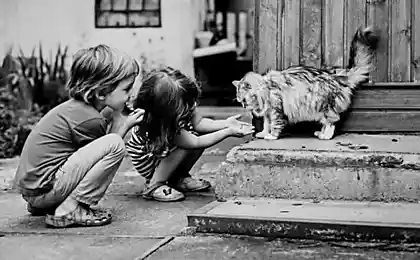322
Why Soviet children listened to their parents, but modern children do not respect their elders
I'm sure you already know the name of Dmitry Karpachev. This popular TV presenter and psychologist has been studying family relationships for many years. He is known to the general public for such TV programs as “Honey, we kill children”, “Save our family”, “lie detector” and “Pregnant at 16”. Today's edition. "Site" will tell you what rules of conversation with children should know each parent, according to Dmitry Karpachev.

If the child stubbornly ignores your words, you can try to correct the situation. Below you will find a list of 8 reasonsChildren do not hear their parents.
I hope this article will help you. communicate with his beloved child. Take note of the above tips of Dmitry Karpachev so that mutual understanding in your child-parent relationship becomes even greater. Good luck!

If the child stubbornly ignores your words, you can try to correct the situation. Below you will find a list of 8 reasonsChildren do not hear their parents.
- Lack of eye contact Children tend to get carried away. At the same time, the smaller the child, the less attention he has. Therefore, if you decide to make a comment to a child when he is busy, you will not be heard. Don’t rush to punish him or punish him. Try making eye contact with him. Go to him, put your hand on your shoulder. And that's when he will be. look at youPlease repeat your request.

- Two in one. “Get undressed quickly, wash your hands and sit down at the table,” what’s wrong with that phrase? Such a chain of tasks is likely to immediately escape the attention of the child. If you want your child to do something, you don’t need to accompany one request with a number of other recommendations. It's better to put things in order.
Ask your child to wear homemade clothes. When this is done, send him to wash his hands. Only then can you invite him to the table. In this way, you allow the child to easily isolate from your speech what he needs to do. Remember: one request, one action.
- Many letters. Noticing the undesirable behavior of the child, parents are often able to voice him a whole tirade. “Peter, how many times can I tell you?” Stop jumping from the couch to the chair. Did you forget the last time you fell and broke your lip? Remember that children are living in the moment. So, don’t hope that in the midst of fun, he will suddenly remember his past experience and stop acting in ways you don’t like.
If you want your child to stop doing something, you don’t have to talk about the past. Say it simply and specifically. “Don't jump from the sofa to the chair. You could fall. Once you see what he heard, you can remember what happened before. But to talk when a child is passionate about something, just meaningless.
479844 - Non-obvious requests Often, instead of asking the child directly for something, parents puzzle him with questions from which he supposedly should draw conclusions: “How long will you walk disheveled?” Do you like walking around with dirty hands? Of course, adults understand what is meant. But the child does not know how to solve these quests. It is better to say as transparently as possible: “Refuel.” Wash your hands. You will see that such direct instructions are much more effective than clever questions.

- Command bans Sometimes parents, without realizing it, tell the child what to do. For example, the phrase “don’t climb a tree” will make the child pay attention to a tree that you can climb. The fact is that our psyche is used to visualizing what we hear. Therefore, it is better to use direct instructions: “Play on the clearing” (not on the tree).

- Radio Liberty Children often ignore their parents because, like the radio, they broadcast something in the background. All they do is repeat requests and prohibitions hundreds of times. However, in order for a child to start paying attention to his parents, he must understand that their requests are necessary for something.
Try to voice your demands a maximum of 3 times. Make sure the baby hears you for the first time. In the second - you can warn him what will happen in case of non-compliance with the request. And the third time, impose the sanctions you told him about. Of course, it is important to keep a balance, because one way or another the child does not have to follow every word you say.
- Scream Sometimes, in order to obtain obedience from the child, parents use a cry. But this method has many disadvantages. Firstly, even if the child fulfills the request after shouting, he is unlikely to understand why he did it. Screaming usually gets kids lost and stupidly does what they're told. Second, the child will eventually realize that parents should only be taken seriously when they are yelling. In other cases, you can ignore them. Third, when you talk to your child in this way, you show them how to communicate with you.
Of course, in some situations, screaming is appropriate. For example, when you need to distinguish your voice from other sounds. In all other cases, you need to learn to communicate with the child. quietlyusing arguments and explanations.
- "Life by the Railroad" Coming to the house of people who live near the railway, every time you will shy away from the sound of a passing train. At the same time, the owners of the house, most likely, have not noticed this noise for a long time. Similarly, the child adapts to constant parental remarks and prohibitions. If you pull him very often, for a long time and for the smallest reasons, he will simply cease to react to what he heard. And this is quite normal, natural. displacement.
Pay attention to how often you try to regulate your child’s behavior. If you realize that this happens too often, your prohibitions should be much less. You only need to ask for what is fundamentally important.
I hope this article will help you. communicate with his beloved child. Take note of the above tips of Dmitry Karpachev so that mutual understanding in your child-parent relationship becomes even greater. Good luck!
Why the hospital needs the icon of the Mother of God “Tenderance”
What did Academician Bekhterev to avoid a deep impoverishment of the mind in old age































